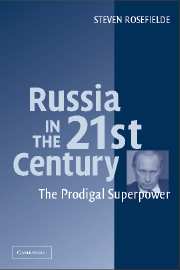Book contents
- Frontmatter
- Contents
- List of Figures and Tables
- List of Acronyms
- Preface
- Acknowledgments
- RUSSIA IN THE 21ST CENTURY
- Introduction
- 1 After “The End of History”
- 2 Prodigal Superpower
- 3 Structural Militarization
- 4 What Could Have Been Done?
- 5 Muscovite Metamorphosis
- 6 Military-Industrial Reform
- 7 National Vulnerabilities
- 8 The Miasma of Global Engagement
- 9 Putin's Choice
- 10 Candor
- Conclusion
- Glossary
- Notes
- Selected Bibliography
- Index
8 - The Miasma of Global Engagement
Published online by Cambridge University Press: 18 December 2009
- Frontmatter
- Contents
- List of Figures and Tables
- List of Acronyms
- Preface
- Acknowledgments
- RUSSIA IN THE 21ST CENTURY
- Introduction
- 1 After “The End of History”
- 2 Prodigal Superpower
- 3 Structural Militarization
- 4 What Could Have Been Done?
- 5 Muscovite Metamorphosis
- 6 Military-Industrial Reform
- 7 National Vulnerabilities
- 8 The Miasma of Global Engagement
- 9 Putin's Choice
- 10 Candor
- Conclusion
- Glossary
- Notes
- Selected Bibliography
- Index
Summary
The diplomatic miasma created by 9/11, the Iraq war, and President George Bush's discovery that Vladimir Putin is a man who can be trusted is making it more difficult for analysts to come to grips with the fatal consequences of the Muscovite syndrome. The Bush administration until recently has been content to portray Putin as an enlightened westernizer even though he stacked regional governorships, the Duma, and his administration with KGB and military officers, placed control over the balloting apparatus solely in the hands of the federal security bureau (FSB), and repressed independent television. It has emphasized his credentials as an economic liberal pressing fiscal federalism, business, tax, and judicial reforms, overlooking the growing power of the central state apparatus and Russia's plutocrats. Further, it praised the Kremlin as a stalwart ally in the battle against nonstate terrorism and the struggle against weapons of mass destruction (WMD) proliferation and as a champion of global arms control and disarmament, turning a blind eye to the Chechen war, “reform” plans for full-spectrum, fifth-generation rearmament, and proscribed weapons sales to Iraq. Just as before, Russian policies were criticized here and there, but the money kept flowing for cooperative space exploration, the dismantling of nuclear weapons (which often meant no more than the removal of replaceable nuclear triggers), the construction of nuclear fuel reprocessing plants (which were then used for other purposes), and joint antiballistic missile defense, along with myriad other thinly veiled “goodwill” handouts, on the false premise that the Kremlin had been redeemed.
- Type
- Chapter
- Information
- Russia in the 21st CenturyThe Prodigal Superpower, pp. 112 - 116Publisher: Cambridge University PressPrint publication year: 2004



